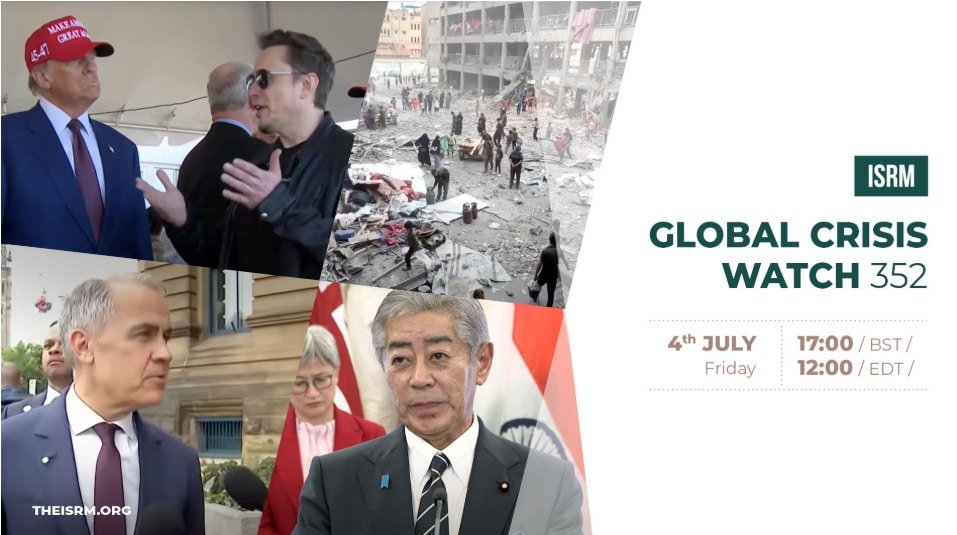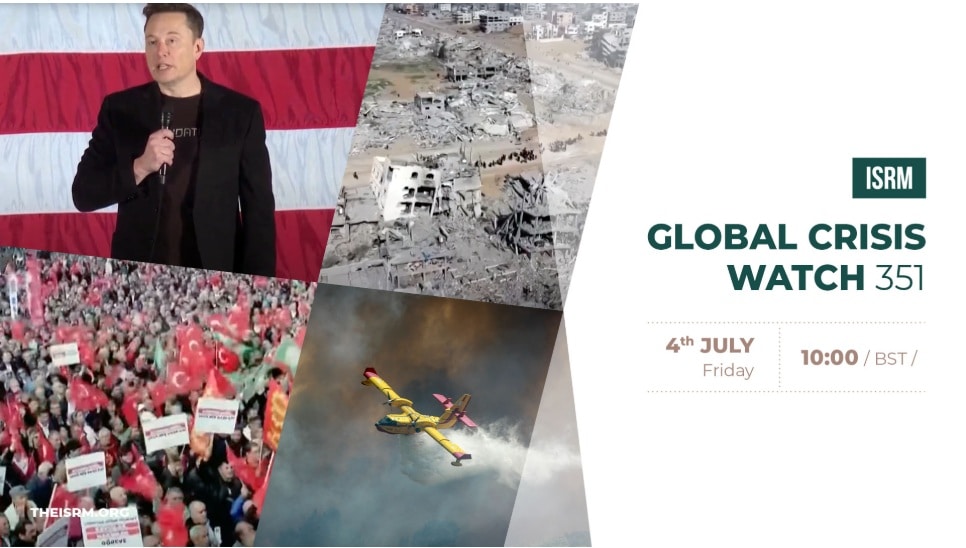The Institute of Strategic Risk Management (ISRM) has announced its latest Global Crisis Watch episodes, 351 and 352. The former focuses on goings on around the world, with the latter focusing more on what is happening in the United States. Both take place tomorrow, Friday July 4, with 351 at 10:00 BST and 352 at 17:00 BST/12:00 EDT. Topics will include Israel/Gaza, Musk threatening a revolt over Trump spending bill, arrests in Turkey, the summer heatwave causing problems in Europe, and more. Read more about these topics, and the others, below.
Israeli strikes kill dozens in Gaza ahead of US Ceasefire talks as Iran reports heavy casualties and Glastonbury faces backlash over anti-Israel chants
Recent developments in the Israeli-Palestinian conflict and related international responses highlight continued violence and diplomatic efforts toward ceasefire. On Monday, Israeli strikes in Gaza killed at least 60 people, marking one of the deadliest days in weeks. Despite US-led ceasefire talks, heavy bombardment persisted, forcing widespread displacement in northern Gaza. Israeli forces targeted militant positions but also hit civilian areas, including schools and a beachfront café. Palestinian health authorities report over 56,000 Palestinians have died since the conflict escalated in October 2023.
Israeli officials, including Prime Minister Netanyahu’s advisor Ron Dermer, traveled to Washington on June 30 for talks with the US administration on ceasefire prospects and regional security, including Iran. The US has proposed a 60-day ceasefire in Gaza tied to a hostage exchange, but Hamas demands Israel’s withdrawal and refuses to disarm, complicating negotiations. Israel insists the war continues until Hamas is dismantled.
Meanwhile, Iran reported 935 deaths during a recent 12-day air conflict with Israel, with significant civilian casualties. Tehran condemned Israel’s strikes as war crimes and vowed to seek international accountability.
US President Donald Trump urged Hamas to accept a “final proposal” for the ceasefire, expressing hope for progress in upcoming talks. Both sides remain deeply divided, with ongoing hostilities impacting civilians severely.
Separately, the Glastonbury music festival in the UK faced criticism after performers led chants calling for “death to the IDF” and expressed strong pro-Palestinian sentiments live on BBC broadcast. The festival and BBC condemned the chants as hate speech, and police launched investigations. The incident sparked political backlash, raising concerns about the platforming of inflammatory messages and the wider impact of the Israel-Palestine conflict on public discourse globally.
These events bring out the continuing humanitarian crisis in Gaza, regional tensions involving Iran and Israel and the complex global responses influencing peace efforts and public opinion.
Musk threatens political revolt over Trump spending bill
The political alliance between US President Donald Trump and Elon Musk has collapsed in dramatic fashion, with escalating threats and financial fallout. The clash centres on Trump’s newly advanced “Big, Beautiful Bill” – a sweeping tax-and-spending package expected to add over $3 trillion to the national debt while stripping electric vehicle (EV) subsidies and green incentives that have long benefited Tesla.
Musk, who previously donated over $275 million to Republican campaigns, launched a social media offensive against the bill and the lawmakers who supported it. He accused them of hypocrisy over government debt and vowed to fund primary challengers, even suggesting the creation of a new populist “America Party.” In response, Trump warned that Musk’s companies – particularly Tesla and SpaceX – could lose billions in government contracts and subsidies. At a White House press conference, Trump said the Department of Government Efficiency (DOGE), originally tied to Musk, “might have to go back and eat Elon.”
The feud has already hit Musk financially. Tesla’s stock fell 7% on Tuesday, after a 2% drop on Monday, missing out on a broader market rally. Analysts estimate Tesla could lose more than $3 billion annually if EV tax credits and emissions-related regulatory sales are removed. These subsidies have been central to Tesla’s business model and its profitability.
Although Musk insists his opposition is rooted in fiscal concerns, critics suggest his real worry is the bill’s impact on Tesla’s bottom line. Trump mocked Musk’s public stance, saying Musk “gets more subsidy than any human being in history” and questioning his loyalty to the US When asked about Musk’s citizenship, Trump cryptically said, “We’ll have to take a look.”
Beyond the financial risks, the feud signals a deeper ideological rift between big tech leaders and Trump’s brand of populist conservatism. With Musk’s political influence and Trump’s control of the Republican Party, the fallout could shape policy debates ahead of the 2026 midterms – particularly on climate, spending and government-private sector relations.
Turkey detains 109 in Izmir corruption probe, while cartoonists arrested over controversial prophet cartoon
Turkish authorities have expanded a major corruption investigation in Izmir, detaining 109 people, including opposition members and former Izmir Mayor Tunc Soyer, according to the state news agency Anadolu. The probe targets irregularities such as corruption, tender rigging and fraud within the city’s municipal administration. A total of 157 people are wanted, with police still searching for 48 suspects. This operation follows a broader crackdown on opposition figures, especially those from the Republican People’s Party (CHP), which is Turkey’s main opposition party. The CHP has condemned the arrests as politically motivated efforts by President Recep Tayyip Erdoğan’s government to suppress dissent and weaken electoral competition. Erdoğan’s administration denies political interference, insisting the judiciary operates independently. Notably, Istanbul Mayor Ekrem Imamoglu, a key Erdogan rival, has also been jailed on corruption charges, fueling protests and investor concerns.
In a separate but related incident highlighting tensions over freedom of expression and religious sensitivity in Turkey, four cartoonists were arrested after publishing a controversial image in the satirical magazine LeMan. The cartoon showed the prophets Muhammad and Moses shaking hands in the sky above missiles, a depiction that enraged religious conservatives and Erdoğan’s ruling AK (The Justice and Development) Party, which labeled it an “Islamophobic hate crime.” Erdoğan condemned the cartoon as a “vile provocation” and vowed legal action against those who disrespect sacred religious figures.
The magazine and the cartoonist denied any intent to insult, stating the image was meant to comment on the suffering caused by recent Middle East conflicts. Nonetheless, the arrests have drawn criticism from civil society groups and press freedom advocates, who view the detentions as a violation of free speech rights. Turkey ranks poorly on global press freedom indexes, with strict limits on media and public discourse.
Together, these events illustrate growing political repression and deep divisions in Turkish society over democracy, religion and free expression, raising concerns about the future of political plurality and civil liberties in the country.
Europe sweats through early summer heatwave, as wildfire risks and health alerts spread
A severe early summer heatwave is sweeping across Europe, breaking temperature records and raising significant health and wildfire risks. Originating from the Iberian Peninsula, the heat dome effect has trapped hot air, pushing temperatures to 40-42°C (104-107°F) in parts of France, Spain, Portugal, Italy, Greece and as far north as the Netherlands.
In France, this extreme heat forced the closure of around 1,350 schools and led to the highest-level heat alerts in 16 departments. The country’s hottest June day on record was recently broken, with firefighters working overtime to control increasing wildfires, especially in the Indre region where fieldwork was banned during peak heat hours.
Portugal experienced temperatures above 42°C (107°F), with emergency services reporting heatstroke cases despite warnings for residents to stay indoors. Italy’s health ministry has put 21 cities on the highest heat alert, causing bans on outdoor work during peak hours in some regions due to a spike in heat-related illnesses, particularly among vulnerable groups such as the elderly.
Greece battled wildfires near Athens, evacuating residents and deploying dozens of firefighters and aircraft. Spain also faced soaring temperatures, with Seville reaching 42°C, leading to health warnings and efforts to help locals and tourists stay cool.
Scientists emphasize that Europe is the fastest-warming continent, experiencing temperature increases at twice the global average. Climate change, driven by greenhouse gas emissions, intensifies these heatwaves, which are now occurring earlier and lasting longer.
Experts warn of the “urban heat island” effect, where cities experience even hotter temperatures due to dense infrastructure. Health authorities urge people, especially vulnerable populations, to avoid physical exertion during peak heat and stay hydrated.
The UK, despite cooler averages, is also experiencing unusual mid-30°C days earlier in the summer, highlighting how climate change is shifting weather patterns. Experts stress urgent action on emissions and adaptation measures to cope with rising temperatures, warning that heatwaves will become more frequent and intense without change.
Register for 351, here

Global Crisis Watch 352 cover the same top two topics of conversation, which focus on Israel/Gaza and Musk’s revolt, as well as Canada rescinding digital services tax to restart US trade talks, and Indo-Pacific partners uniting on minerals supply as trade talks face challenges. Read more about these below.
Canada rescinds digital services tax to restart US trade talks
Canada has announced it will rescind its planned digital services tax (DST) to resume trade negotiations with the United States. The DST, introduced in 2020, was set to take effect retroactively from 2022 and would have imposed a 3% tax on revenues of large online companies such as Amazon, Google, Apple and Meta operating in Canada. The tax was expected to generate nearly C$6 billion over five years.
US President Donald Trump labeled the DST “a direct and blatant attack” on American businesses and canceled trade talks on June 28th, threatening tariffs on Canadian goods. In response, Canadian Finance Minister François-Philippe Champagne announced on June 30th that Canada would withdraw the tax to support a comprehensive trade agreement. Prime Minister Mark Carney confirmed that trade talks with the US would resume, aiming to reach a deal by July 21st, 2025. The decision also follows mounting concerns from Canadian business groups, who warned that the DST risked triggering a trade war with significant economic consequences for Canadian exporters.
The White House praised Canada’s decision, calling it a “big victory” for US tech companies and workers. White House Press Secretary Karoline Leavitt said Canada had “caved” under US pressure, while Canadian opposition leader Pierre Poilievre criticized the government for backing down at the last moment. Poilievre urged Carney to demand the removal of US tariffs on Canadian softwood lumber in exchange.
The DST was designed to address concerns that multinational tech firms pay limited tax on revenues earned in Canada due to their global business structures. However, the tax became a major point of contention in the US-Canada trade relationship. Since Trump’s return to office, trade between the two neighbours has been strained by tariff threats and policy shifts, creating uncertainty for businesses. Canada’s move mirrors similar back-stepping from the EU on imposing taxes on US corporates with revenues above €750 million, despite the fact that this was an agreed global policy supported by 120 countries through the OECD in 2020.
Canada is the US’s largest trading partner, importing $349 billion and exporting $413 billion worth of goods last year. This tax rollback highlights the complexities of taxing global digital companies while maintaining strong economic ties with the US.
Indo-Pacific partners unite on minerals supply as trade talks face challenges
The United States and its Indo-Pacific partners Australia, India and Japan – known as the Quad – have launched a Critical Minerals Initiative aimed at reducing dependence on China’s dominant control of key mineral supply chains. The initiative, announced during a ministerial meeting in Washington, seeks to boost economic security and resilience by encouraging cooperation among the four nations to diversify sourcing of essential minerals used in technology and defense sectors. US Secretary of State Marco Rubio highlighted the importance of moving from talk to action, with dozens of companies from Quad countries scheduled to discuss collaboration.
Despite this shared goal, tensions persist within the Quad, primarily due to US President Donald Trump’s aggressive tariff policies affecting all members. Trump remains optimistic about a potential trade deal with India that could lower tariffs and benefit US companies but is skeptical about reaching a similar agreement with Japan by the July 9th deadline. Indian Foreign Minister Subrahmanyam Jaishankar emphasized the need for compromise to finalize a deal.
Trade talks between the US and India continue amid disagreements on market access, especially India’s protection of its agricultural sector and import-quality regulations. While both sides aim to secure a “mini-deal” focusing on industrial tariffs and strategic commitments, issues such as intellectual property and digital trade are likely to be deferred to future discussions.
The Quad also released a joint statement condemning the deadly April attack in Kashmir, which escalated tensions between India and Pakistan. This reaffirmed the group’s concern over regional security and stability.
Overall, the Quad’s new minerals initiative signals an increased focus on economic and security cooperation to counterbalance China’s influence, even as underlying trade disputes and geopolitical challenges complicate partnerships.
All these will be covered, plus all the stories that are catching attention wherever we live in the world. Feel free to join and add your voice to the conversation.
For more ISRM news, click here




